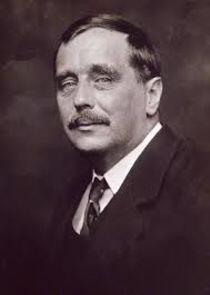
H.G. Wells
In addition to his fame as a writer, he was prominent in his lifetime as a forward-looking, even prophetic social critic who devoted his literary talents to the development of a progressive vision on a global scale. As a futurist, he wrote a number of utopian works and foresaw the advent of aircraft, tanks, space travel, nuclear weapons, satellite television and something resembling the World Wide Web. His science fiction imagined time travel, alien invasion, invisibility and biological engineering before these subjects were common in the genre. Brian Aldiss referred to Wells as the "Shakespeare of science fiction", while Charles Fort called him a "wild talent".: 7
Wells rendered his works convincing by instilling commonplace detail alongside a single extraordinary assumption per work – dubbed "Wells's law" – leading Joseph Conrad to hail him in 1898 with "O Realist of the Fantastic!". His most notable science fiction works include The Time Machine (1895), which was his first novella, The Island of Doctor Moreau (1896), The Invisible Man (1897), The War of the Worlds (1898), the military science fiction The War in the Air (1907), and the dystopian When the Sleeper Wakes (1910). Novels of social realism such as Kipps (1905) and The History of Mr Polly (1910), which describe lower-middle-class English life, led to the suggestion that he was a worthy successor to Charles Dickens,: 99 but Wells described a range of social strata and even attempted, in Tono-Bungay (1909), a diagnosis of English society as a whole. Wells was nominated for the Nobel Prize in Literature four times.
Wells's earliest specialised training was in biology, and his thinking on ethical matters took place in a Darwinian context. He was also an outspoken socialist from a young age, often (but not always, as at the beginning of the First World War) sympathising with pacifist views. In his later years, he wrote less fiction and more works expounding his political and social views, sometimes giving his profession as that of journalist. Wells was a diabetic and co-founded the charity The Diabetic Association (Diabetes UK) in 1934.
Biography from the Wikipedia article H. G. Wells. Licensed under CC-BY-SA. Full list of contributors on Wikipedia.
Part of Crew
Recently Updated Shows

The Ark
The Ark takes place 100 years in the future when planetary colonization missions have begun as a necessity to help secure the survival of the human race. The first of these missions on a spacecraft known as Ark One encounters a catastrophic event causing massive destruction and loss of life. With more than a year left to go before reaching their target planet, a lack of life-sustaining supplies and loss of leadership, the remaining crew must become the best versions of themselves to stay on course and survive.

Elsbeth
Elsbeth follows Elsbeth Tascioni, an astute but unconventional attorney who utilizes her singular point of view to make unique observations and corner brilliant criminals alongside the NYPD. After leaving her successful legal career in Chicago to tackle a new investigative role in New York City, Elsbeth finds herself jockeying with the toast of the NYPD, Captain C.W. Wagner, a charismatic and revered leader. Working alongside Elsbeth is Officer Kaya Blanke, a stoic and ethical officer who quickly develops an appreciation for Elsbeth's insightful and offbeat ways.

Revival
Revival is set on one miraculous day in rural Wisconsin when the recently deceased suddenly rise from their graves. But this is no zombie story as the "revived" appear and act just like they once were. When local Officer and single mother Dana Cypress is unexpectedly thrown into the center of a brutal murder mystery of her own, she's left to make sense of the chaos amidst a town gripped by fear and confusion where everyone, alive or undead, is a suspect.





